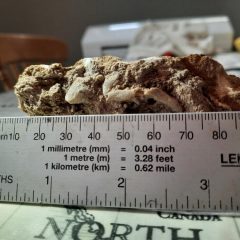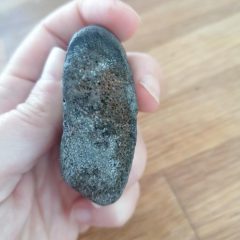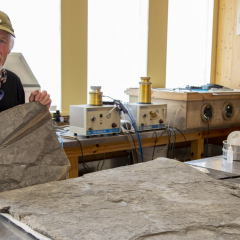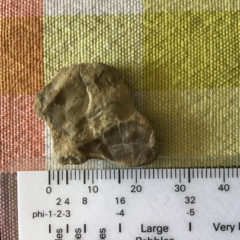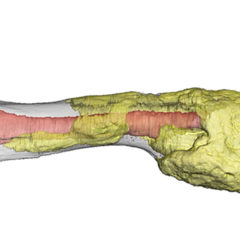Could Ben have Discovered a New Carboniferous Crustacean Species?
On a recent family field trip to Berwick-Upon-Tweed in Northumberland, Rockwatcher Ben unearthed not one but two fossil finds from the same boulder. The first of these, probably a tooth, is fairly typical of the kind of fossil found on Northumberland’s beaches. With the geology of Berwick-Upon-Tweed being formed of Carboniferous rocks mostly comprised of sandstone and limestone, this area is known for brachiopods, crinoids, corals and...
Freya’s Dinosaur Bone Discovery at Compton Bay
Famed for its huge dinosaur footprints at low tide, Compton Beach on the Isle of Wight is something of a fossil hunter’s pilgrimage seeing thousands of amateur and professional geologists every year. So, it’s perhaps not surprising that Rockwatcher Freya, who was holidaying with her family, found a dinosaur bone fossil on her recent visit given that the Isle of Wight – or Dinosaur Island as it’s become affectionately known – is home...
Live preparation of a probable new species of Ichthyosaur
Dr Steve Etches, a familiar figure for Rockwatchers visiting Dorset or attending our residential fieldtrip, will be preparing a rare Ichthyosaur in his glass walled workshop at his museum. Visitors will be able to go along and watch him working on the fossil and also watch him from above via the live feed on a large television screen. It’s a rare chance to witness live the painstaking preparation of...
Oliver’s Fossil Find
Oliver recently discovered a fossil whilst exploring the Lea Quarry on the Wenlock Edge in Shropshire, which is a popular Rockwatch fieldtrip location and sent this fabulous find in to ask for help in identifying it. We’d love to go back there again with Rockwatchers as soon as it is safe for us to do so! Already knowledgeable about the local geology of the area and keen to understand what he had found, Oliver explained,...
Bone Cancer Diagnosed in Dinosaur
Rockwatchers interested in the fields of geology and medicine may be intrigued to read a post written by Gretchen Vogel of Science magazine that reports on some fascinating findings recently published in The Lancet Oncology confirming a bone cancer diagnosis in a dinosaur. The dinosaur bone belonged to a Centrosaurus, which was a horned, plant-eating dinosaur. This particular dinosaur, discovered in Alberta in Canada, lived...

